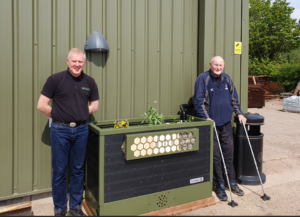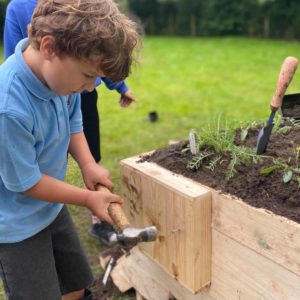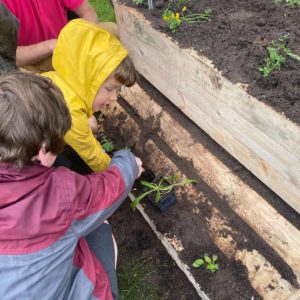Supporting Schools
More and more research has shown that nature is not just good for kids’ health, but it also improves their ability to learn. Even small doses of nature can have profound benefits.
Studies have shown that learning in a nature-rich environment results in significantly stronger reading and writing skills and that students perform better academically, especially if they come from lower socio-economic backgrounds.
Access to wildlife-rich space improves children’s psychological and physical wellbeing, increasing physical fitness, reducing stress and promoting social connection and creativity. Spending even a little time in nature restores attention, helping students to be more engaged and interested in the classroom aiding concentration, and improving their relationships with teachers and peers.
The Covid-19 pandemic showed that we don’t have enough access to nature and this is especially true for people in more deprived socio-economic groups. A recent survey by Natural England, for example, found that children from low-income families spent less time outside in green spaces during the pandemic than children from higher-income families.
Where BioScapes® can help
The school playground holds so much potential – not only for the pupils who play and learn there but also for the local wildlife that calls the school grounds their home! The benefits of sharing our outdoor space with wildlife are unrivalled. Connecting with nature plays a big part in pupils’ wellbeing and brings their learning to life as they develop an interest on caring for the environment.
At BioScapes, we have developed a range of multi-habitat units specially designed to support a wide variety of our native species from hoverflies to hedgehogs. As self-contained units WildPod®, NatureArk® and BioCube® provide a one-stop-shop for wildlife, helping to create space for biodiversity in any outdoor area.
Our innovative and patented range of products are designed to help schools increase the biodiversity of their outdoor space, but it’s not just the wildlife at your school that will benefit!
A recent survey by Natural England found that children from low-income families spent less time outside in green spaces during the pandemic than children from higher-income families. Other studies have shown that learning in a nature-rich environment results in significantly stronger reading and writing skills and that students perform better academically, especially if they come from lower socio-economic backgrounds.
Access to nature-rich space also improves children’s psychological and physical wellbeing by reducing stress, increasing physical fitness and promoting social connection and creativity. Spending even a little time in nature restores attention, helping students to be more engaged and interested in the classroom aiding concentration, and improving their relationships with teachers and peers.
In summary, our biodiversity-boosting solutions are proven to:
- Boost physical activity and improve wellbeing – pupils can get involved in building, planting, and caring for the habitat.
- Expand outdoor learning opportunities – the self-contained habitats provide homes for a wide range of animals to learn about.
- Boost learning engagement – bring learning about nature, wildlife, and biodiversity to life.
Click on the links below to see how our products are being used in education settings already and for information on how they apply to the national curriculum.

Case Study: J A Kent SuDS & BNG Unit Installation
After constructing a new building at their headquarters, JA Kent faced the challenge of managing additional rainwater run-off. They saw an opportunity to address this need while also boosting their site’s biodiversity value.

How BioScapes is helping schools across the UK – case studies and feedback
From time spent in the fresh air to learning about ecosystems, schools are already experiencing multiple benefits from interacting with BioScapes products, as you’ll see

How BioScapes products link to the national curriculum
BioScapes habitat units help establish a diverse ecosystem that, in return, creates opportunities for learning throughout the year. From the deadwood zone to hedgehog home

believe housing Case Study
believe housing looks to BioScapes® to help achieve biodiversity targets BioScapes® has teamed up with one of the largest housing associations in North-East England, believe

